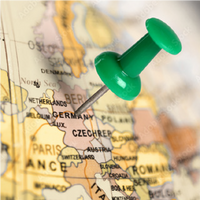- Project “magna cura”
- Who are skilled workers for Germany?
Qualification, further training and advanced training opportunities for nursing in Germany
Tasks and Fields of Work for Nursing Staff
Professional and Expert Associations
Information on Gainful Employment
Social Insurance Law in Germany
Immigration Process and Furtherance of Integration
Infrastructure of Advice on Migrations and Integration
Political, social, religious and cultural participation possibilities
Recognition Procedure
Information on Learning the Language
Neutral Advice and Other Support
- How to apply for "magna cura" project
- Resume for Nurse guidelines for your application
Social Market Economy
Germany is Europe’s largest economy and its industrial powerhouse – selling cars like Mercedes-Benz, BMW, Porsche, Audi and VW and chemical products like “aspirin” to the world. The quick recovering of the German economy after World War II still appears as an “Economic Miracle”.
The “Social Market Economy”. How is efficient capitalist order combined with a huge welfare state? How are conflicts smoothed by incorporating the unions into “Social Partnership”? You will be surprised how modern efficient capitalism and corrupt medieval traditions are merged into “Social Market Economy”.
The social market economy forms the basis for our society – a society characterised by freedom, openness and solidarity. According to these principles, the government must afford businesses freedom to operate on a level playing field whilst also promoting prosperity and social security for the people living in Germany. Ensuring the preservation of global ecological assets, including the climate and biodiversity, will, however, require a fundamental development in the German and the international regulatory framework.
Bound for Germany
You are trained in nursing and are considering a move to Germany? And you would like to work here as a professional nurse? Maybe you have already been approached by a placement agency or language school about your potential for the German labour market. The labour migration of international professionals is a promising prospect, particularly with the increasing demand for professional staff in the healthcare and nursing sectors in Germany. It is also, however, a major step that should be well planned and well organised.
You will therefore find in this brochure specific information on the living and working conditions in Germany. First of all, the following pages will provide you with an initial overview of your options as an international professional nurse. You may regard the brochure as the basis for your further research. We encourage you to seek out reliable sources and question information that seems overly simplified or makes unrealistic promises. The more information you obtain from other media, the better prepared you will be for your exciting path toward working as an international professional nurse.
After extensive research you may decide for yourself whether you wish, in the future, to work in Germany as a nurse. If you enter the application phase well informed, you will be able to guard against complications and delays. We hope you thoroughly enjoy your research and that you find the courage to explore the possibilities you have abroad.
Information on the Professional Field
As a profession, nursing care is not practised in the same way everywhere in the world. Certain characteristics set the German approach to nursing apart from other countries in international comparisons. In this brochure, you will learn exactly what that means for your recruitment and recognition procedure. You will also learn some fundamentals about your professional activity as a nurse in Germany.
You should know beforehand that nursing staff in Germany can work in different types of institutions. This means that health and social care providers can be run by different organisations. These include:
Privately organised institutions (in other words private companies)
Institutions run by churches (for example Caritas and Diakonie)
Institutions run by non-church charity associations
(for example AWO (Workers‘ Welfare Association) and Rotes Kreuz (Red Cross)
State-run institutions (for example university clinics)
Nursing Professions are regulated professions
In Germany, nursing professions are so-called “regulated professions”. What does that mean?
What you should know:
Regulated professions are professions for which the training is prescribed by the State. In the federally organised country of Germany this means that regulated professions are organised by either the Federation or by one of the Federal States. The Federation consists of all 16 Federal States. Regulations at the federal level thus affect all Federal States. Regulations at the State level, however, apply only to the respective Federal State.
Should you wish to work in a regulated profession in Germany, you must submit an application for professional accreditation. In this way, you prove your training and thus also your qualification for the relevant profession. Only after you have been granted professional accreditation you will be able to work as a nurse in Germany. Should you have concluded your vocational training in another country, you must first of all have your final certificate recognised in Germany. Once this is done, you may be granted professional accreditation in Germany. You may then officially work in a regulated profession.
You can obtain detailed information here:
Further information on this topic may be found here, for example:
www.pflegeausbildung.net
The website “Perspektive Gesundheitswirtschaft (Perspectives for the Healthcare Sector)” run by the Berlin IQ network also provides you with an overview of the healthcare sector.
Here you may obtain detailed information on qualification requirements and fields of work:
www.kompetenzen-gesundheitsberufe.de


